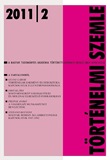Szakemberbõl politikus – Hóman Bálint
From Professional to Politician – Bálint Hóman
Author(s): Levente PüskiSubject(s): History
Published by: Magyar Tudományos Akadémia Bölcsészettudományi Kutatóközpont Történettudományi Intézet
Summary/Abstract: Bálint Hóman had been a renowned historian and cultural politician already in the 1920s. His political career started in 1932, when he became a member of the government led by Gyula Gömbös, and, with a brief interruption, he directed the work of the Ministry of Religion and Public Education until 1942. Until the late 1930s his ministerial activities had been rather professional, but from 1938 he became more active in other fields as well, and from early in 1939 he was regarded as an influential figure of Hungarian politics. His political views were organised around three major themes: he was a supporter of a close alliance with Nazi Germany, decisively endorsed the antisemitic legislation, and urged for an authoritarian reorganisation of the political system of Hungary. Within the governing party he strictly opposed those conservative forces which emphasised the importance of protecting constitutionalism, of moderating antisemitic measures, and of maintaining relations with the Anglosaxon powers. As one of the leaders of the governing party, at the turn of 1938/1939 he actively supported the policies of prime minister Béla Imrédy, and assumed a role in the leadership of Imrédy’s newly established party called Hungarian Life Movement. During the administration of Imrédy’s successor, Pál Teleki, he was one of the main supporters of pro-German foreign policy within the government. Although Hóman always distanced himself from the Hungarian National Socialist movement, his views and political activities leave little doubt that he supported the right extremist wing of the governing party. Moreover, he frequently used his professional authority to justify his political stance. In 1942 he resigned the ministry and never assumed a governmental post any more, but retained his seat in the parliament until the end of World War II. His political views, the main elements of which had been formed in the late 1930s, remained basically unaltered thereafter. After the German occupation of Hungary in March 1944 he was ready to support all governments which stuck to the German alliance and wanted to continue the war against the Soviet Union. Consequently, late in 1944 he even aligned himself with the Hungarian fascist government, and later followed it to German territory. After the war he was put to popular trial on account of his extremist views and political actions during the war, and was sentenced to life imprisonment.
Journal: Történelmi Szemle
- Issue Year: 2011
- Issue No: 02
- Page Range: 215-234
- Page Count: 20
- Language: Hungarian

